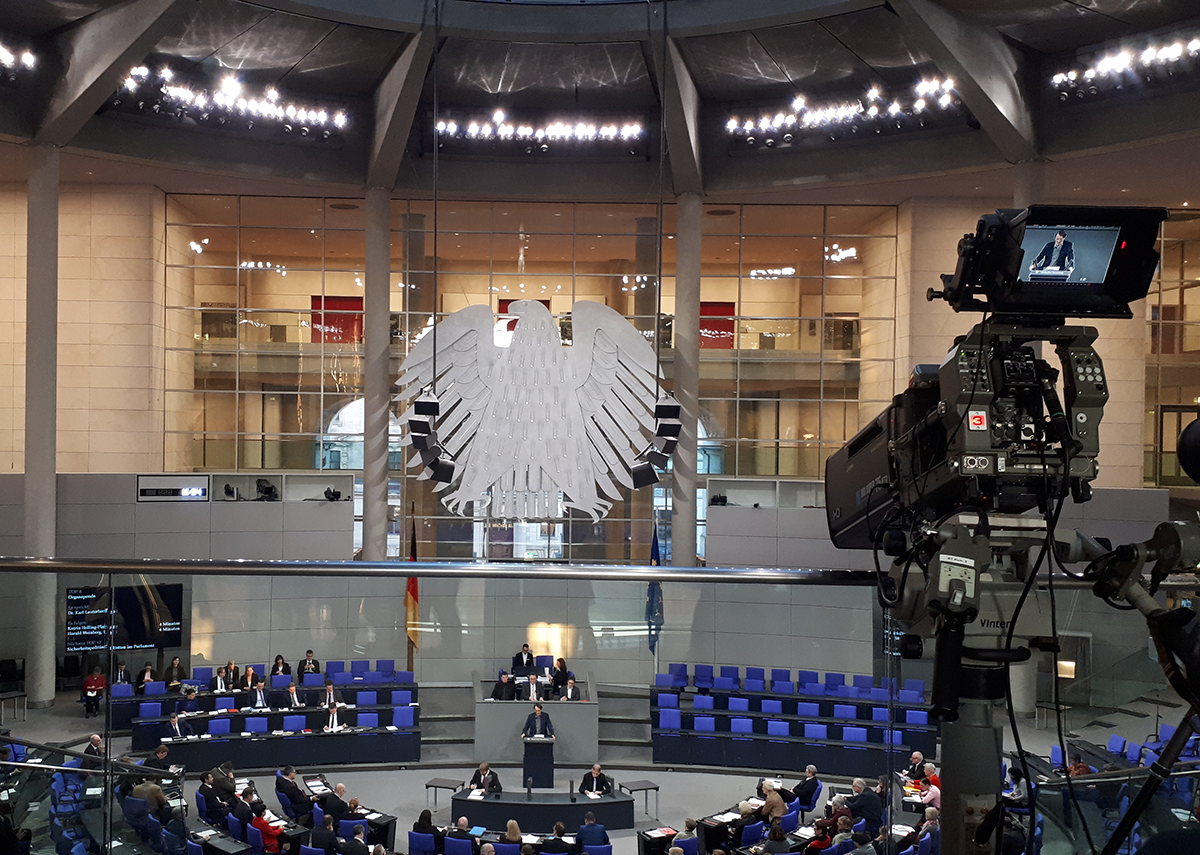Bundestag in overdrive: Coalition is pressing the pace for the Building Energy Act (GEG) – wants to get it through the Bundestag on Friday
Language selection 📢
Published on: September 6, 2023 / update from: September 6, 2023 - Author: Konrad Wolfenstein

Bundestag in overdrive: Coalition is pushing the pace for the Building Energy Act (GEG) – Image: Matthias Wehnert|Shutterstock.com
The government no longer wants to negotiate, despite strong criticism!
The importance of the reform of the Building Energy Act (GEG) for the traffic light coalition
The traffic light coalition is defending its plan to hold the final vote on the reform of the Building Energy Act (GEG) in the Bundestag on Friday. They emphasize the importance of a decision on the law in order to avoid damage to the parliamentary process. The second and third readings of the law are now scheduled for September 8, after delays due to Federal Constitutional Court requirements. Irene Mihalic, spokeswoman for the Green Party, mentioned that MPs had two additional months to thoroughly examine the Building Energy Act and that there were no concrete proposals for changes from the Union parliamentary group.
Background of the Building Energy Act (GEG)
The Building Energy Act (GEG) is of great importance for the energy transition and Germany's sustainability goals. It regulates the energy requirements for buildings and is intended to ensure that they become more energy efficient. This is a crucial step to reduce carbon emissions and combat climate change.
The role of the traffic light coalition
The traffic light coalition, consisting of the SPD, the Greens and the FDP, has set itself the goal of driving forward the energy transition and putting Germany on a sustainable path. The reform of the GEG is an important step in this direction. They emphasize the urgency of this reform, as time is running out to achieve the climate goals.
The challenges on the way to reform
However, the reform of the GEG has its challenges. The delays due to the requirements of the Federal Constitutional Court have thrown the schedule into disarray. However, it is important that MPs use the time to carefully examine the law and ensure that it achieves its desired objectives.
Lack of suggestions for changes
Irene Mihalic from the Green Party has emphasized that there are currently no concrete proposals for changes from the Union. This can be interpreted as a sign that the Union could accept the law in its current form. This would be a big step towards consensus and could help to successfully complete the reform of the GEG.
The reform of the Building Energy Act (GEG)
The reform of the Building Energy Act (GEG) is of great importance for the traffic light coalition and the entire nation. It ensures that buildings become more energy efficient and thus contributes to combating climate change. Despite the challenges and delays, the traffic light coalition remains determined to successfully complete the reform and advance the energy transition in Germany. The final vote next Friday will be a crucial moment in this process.
Bundestag in overdrive: Coalition is pressing the pace for the Building Energy Act (GEG) - wants to get it through the Bundestag on Friday
The latest developments in connection with the Building Energy Act (GEG) are of great importance. The coalition in the Bundestag is showing determined speed to pass the law next Friday. This raises some important questions.
1. What is the Building Energy Act (GEG)?
The Building Energy Act (GEG) is a legal basis for regulating the energy efficiency of buildings in Germany. It brings together various regulations and is intended to ensure that buildings become more energy efficient.
2. Why is the coalition pushing the pace?
The coalition's haste is due to various factors. These are ideological-political commitments, environmental aspects and should also include economic considerations.
3. What effects does the GEG have on society?
The GEG can have a significant impact on society as it promotes the energy efficiency of buildings. This can lead to cost savings for consumers and help reduce energy consumption - but also to high investment costs.
4. How will the law affect the construction sector?
The construction sector is likely to be heavily impacted by this law as it introduces new standards and requirements for energy efficient buildings. This could affect the construction process and costs.
5. What political challenges can be expected?
The passage of a law in the Bundestag can bring political challenges. Opposition parties and interest groups could hold different views.
6. Are there opinions from experts or interest groups?
It is important to consider the opinions of experts and stakeholders. They could provide information and insight that deepens the discussion.
7. What role does energy efficiency play in Germany?
Energy efficiency is an important aspect of German policy, especially given efforts to reduce CO2 emissions and climate change.
9. What effects does the GEG have on consumers?
Consumers can benefit from this law by reducing long-term energy costs and being able to use more environmentally friendly buildings.
📣 Similar topics
- Introduction to the Building Energy Act (GEG): Everything you need to know about the GEG.
- The haste in the Bundestag: Why the coalition wants to pass the GEG quickly.
- Impact on society: How the GEG could impact society.
- The construction sector and the GEG: What challenges and opportunities arise for the construction sector?
- Political discussions: What political debates could develop around the GEG?
- Expert opinions: What do experts and interest groups say about the GEG?
- Schedule for the vote: When is the vote expected in the Bundestag?
- Germany's focus on energy efficiency: Why is energy efficiency so important in Germany?
- Benefits for consumers: How do consumers benefit from the GEG?
- Implementation of the GEG: What steps can be expected after the adoption of the GEG?
#️⃣ Hashtag: #Building Energy Act #Bundestag #Energy Efficiency #PoliticsGermany #Environmental Protection
Criticism of the draft of the Building Energy Act: Experts and lobbyists criticize technical errors
Energy industry experts and lobbyists have sharply criticized the draft of the Building Energy Act. In their eyes, the draft has numerous technical errors and uncertainties that urgently need to be remedied. Despite this criticism, the government plans to pass the law without further parliamentary consultation. This has led to strong opposition from the opposition trying to block the move, which could potentially cause significant delays. After the passage of the Building Energy Act, it is expected that it will continue to dominate the Bundestag agenda.
The criticisms of the draft
Criticism of the draft Building Energy Act focuses on various key aspects. Experts point out that the definitions and requirements in the law are unclear and inconsistently formulated. This could cause confusion for those who need to implement the law and lead to legal disputes.
Another point of criticism concerns the objectives of the law. Many lobbyists and experts are concerned that the proposed energy efficiency standards are not enough to achieve Germany's long-term climate goals. They are calling for stricter regulations to ensure that buildings are truly energy efficient and make a positive contribution to environmental protection.
The planned adoption without further parliamentary consultation
A particularly controversial decision is the government's intention to pass the Building Energy Act without further parliamentary consultation. This is met with strong opposition from the opposition, who argue that such an important law should be carefully examined and debated. There are concerns that the technical errors and uncertainties in the law may only become apparent after its passage, which could lead to significant problems.
The resistance of the opposition
The opposition parties are doing everything they can to prevent the Building Energy Act from being passed without further consultation. They have already announced that they will block the law in the Bundestag to allow for a thorough revision and discussion. This could lead to significant delays in the implementation of the law and has caused political controversy.
The draft of the Building Energy Act
The draft of the Building Energy Act is the subject of intensive discussions and criticism. Experts and lobbyists are urgently calling for a revision to eliminate technical errors and uncertainties. The planned adoption without further parliamentary consultation is facing strong opposition from the opposition, which could lead to potential delays. The future of this law remains uncertain as debate continues to dominate the political stage.
The next hammer is looming: EU obligation to renovate – the Building Energy Act (GEG) is just the calm before the storm
More about it here:






























